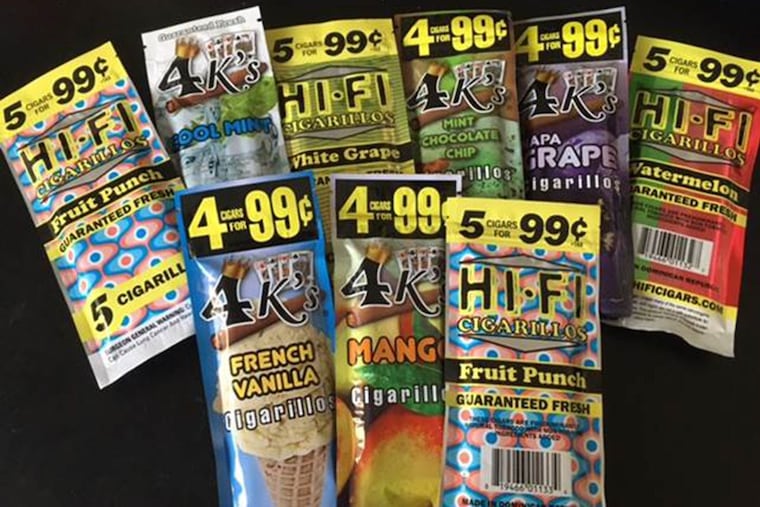Philly's No. 1 killer isn't guns or opioids - but it can be stopped | Commentary
It's hard to imagine a more cynically designed product than a cheap smoke laced with sweet candy flavorings. But that's what is in stores in low-income and minority neighborhoods in Philadelphia.

Recently, Philadelphia City Council held a hearing to shine a light on a particularly pernicious trick that tobacco companies use to entice people to smoke: infusing cigars and cigarettes with seductive "flavorings."
Smoking is still Philadelphia's number one killer, responsible by recent estimates for the deaths of more than 3,600 people a year. In part, that's so high because about 22 percent of adults in Philly smoke, far more than the 15 percent of adults nationally, according to the U.S. Centers for Disease Control and Prevention. As smoking rates have fallen over the years, the tobacco industry has come up with ever more inventive marketing tactics. Because nearly 90 percent of smokers start before age 18, those tactics mostly target kids.
It's hard to imagine a more cynically designed product than a cheap smoke laced with sweet candy flavorings. But that's what is on store shelves in low-income and minority neighborhoods in Philadelphia. Cigarillos spiked with such flavors as grape, watermelon, and fruit punch (using the same flavoring chemicals as Jolly Ranchers, Life Savers and Kool-Aid) are wrapped in brightly colored, kid-friendly packs and placed right next to candy on the shelves.
Cigarillos are the penny-candy of tobacco products, priced at four for a dollar, about one-tenth the price of a pack of cigarettes and within easy reach of kids carrying only spare change. They are probably why Philadelphia's youth, especially minority teens, are increasingly smoking cigars, even as they have cut back on cigarettes. In 2015, 7 percent of teens smoked cigarettes, but 11 percent smoked cigars.
It's against the law for stores to sell tobacco to minors under age 18, but children get their hands on these products anyway. The Health Department sends undercover youth into stores to test compliance with the law, and found in 2016 that 12 percent of tobacco retailers sold cigarettes to them. While the Health Department is stepping up its enforcement and will begin revoking tobacco sales permits for retailers that are repeat offenders, there will always be retailers who flout the law and teenagers will find them.
As teen smokers become adults, they tend to realize the addiction is hurting them and try to quit. So for years the tobacco companies have used another flavoring to keep adults smoking.
Many cough drops contain a chemical called menthol. It works by numbing the back of the throat. If a cold is keeping you awake at night, suppressing a cough with menthol may be convenient. But if the cough is your body warning you about the harm caused by tobacco smoke, suppressing it can be deadly. Tobacco companies put menthol in cigarettes – those brands such as Newport, Salem, and Kool in green packs – specifically so that smokers are numb to the damage the smoke is doing. The result: Teens who start with menthol-containing cigarettes are about twice as likely to become long-term smokers, according to a U.S. Food and Drug Administration report. In other words, menthol makes cigarettes more addictive.
In 2009, Congress prohibited cigarettes that contained any flavorings – any except one, that is. Bowing to the pressure of the tobacco lobby, Congress continued to allow menthol. But then the FDA, which regulates menthol as a drug when it is used in medical products, asked a group of scientific experts for advice. The experts were clear that prohibiting menthol in tobacco products would likely save many thousands of lives. Today the FDA could do that, but in the Trump administration, a menthol ban isn't likely to happen.
So cities have begun to act. San Francisco recently passed a ban on the use of flavorings in tobacco products, including candy-flavored cigarillos and menthol cigarettes. Across the bay, Oakland's City Council took the same step. Minneapolis banned candy-flavored cigars in 2015 and is now weighing a ban on menthol cigarettes.
Our city has a proud chapter in the history of the battle against the tobacco industry. Back in 1990, R.J. Reynolds came to Philadelphia to test-market Uptown, a new menthol-flavored cigarette targeted specifically at African Americans. Infuriated community leaders fought back. They enlisted the help of Louis Sullivan, then-U.S. secretary of Health and Human Services, who called out Uptown as offering only "more disease, more suffering, and more death." R.J. Reynolds backed down.
It's time for Philadelphia to take up that battle again. Yes, Uptown cigarettes would have caused many people in this city to suffer and die unnecessarily. But candy-flavored cigarillos and menthol cigarettes are, in fact, causing many people here to suffer and die unnecessarily today. It's time to tell the tobacco companies that we're not going to fall for those tricks anymore.
Thomas Farley, MD, MPH, is the commissioner of the Philadelphia Department of Public Health.